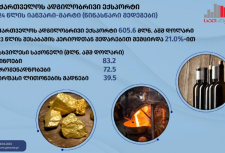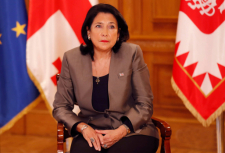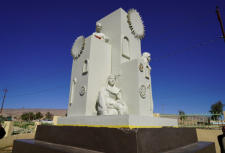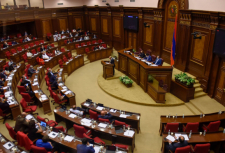Serenity for Sinjar: Resiliency and Reconciliation
A Strategic Approach Summary: Serenity for Sinjar
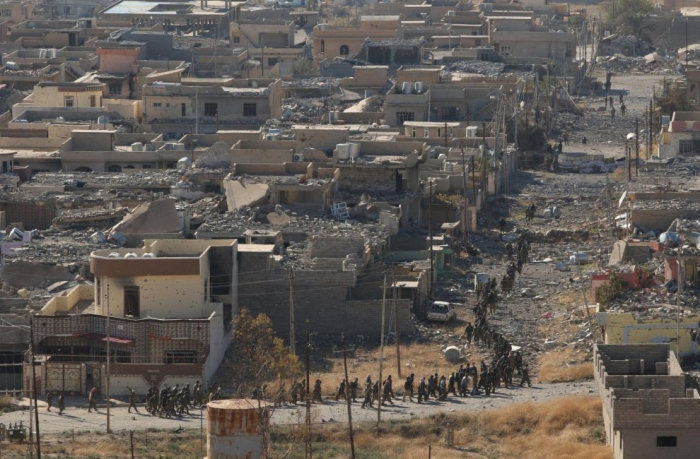
Part-1
The ability for multiple communities to coexist without resorting to violence is a small part in efforts of reconciliation. Respect and social equality take some part while elements such as reflection and acknowledgement of the past can help to further instill trust in relationships allowing expiation and forgiveness to eventually take place. While reconstruction is crucial in the Yazidi case, sometimes smaller steps of reconciliation such as peaceful coexistence and mutual respect for basic human rights constitute significant outcomes and is the most that can be asked for in societies recovering from severe conflict (van Koonen, Wirya 2017).
This strategy is broken up into three parts: justice, security, and reparations. It is based off of a study conducted containing interviews with the Yazidi population and their wishes following the 2014 Daesh (ISIS) attack. This strategy does not propose to solve all of the many issues the Yazidi population is plagued with but to begin the path to reparation and reconciliation to circumvent future violence. Members of the Yazidi and international communities have already begun to work to physically repair the Yazidi homeland, but there are seemingly no tangible efforts in reconstruction, and, while reconstruction is vital, it is not enough. By repairing relationships with the Kurdish and Iraqi population as well as building a community support system, this strategy aims to bring stability to a region that remains turbulent and vulnerable.
Justice
This strategy defines justice as legal and social — fair and just trials of those who perpetrated war crimes against the Yazidis and the continuation of mass grave exhumation while working to diffuse collective guilt through community engagement and education of the Yazidi in schools. Efforts will also move to further repair infrastructure in the Sinjar region with partnership between local and international aid and, most of all, the Yazidi people. Great examples of those who are already working towards this goal — and those who can support this effort — are Nadia Murad, a Yazid Daesh survivor who works to advocate for the Yazidi genocide through her organization Nadia’s Initiative and Amal Clooney, who is an international human rights attorney who already works closely with Nadia as her representation. Rather than turning to local courts in Iraq that are deeply influenced by sharia — Islamic Quranic law — this strategy proposes all trials of ISIS war crime perpetrators be processed through the International Criminal Court. The international community has already asked the international tribunal to try ISIS members and, with partnerships to those who are already fighting this fight, the goal is to benefit the Yazidi in a fair and just outcome, freeing all impositions of Islamic belief which has created a great deal of strife in the Yazidi community in the past. These trials would hold perpetrators accountable and give peace of mind by providing rightful justice to the Yazidi people as they continue on a path to restitution.
In conjunction with the trials, mass grave exhumation is imperative to fostering resiliency and security. There are reportedly 202 mass graves from the ISIS attacks on Sinjar. In March 2019, the UN began exhuming these grave sites and Iraq has begun to identify victims, which are estimated to be between six to twelve thousand. While exhumation is a strenuous and emotionally taxing process, these graves create leverage to the Yazidi people under the Government of Iraq. Under laws derived from international human rights law and international humanitarian law — both treaty and customary international law and international criminal law — the Iraqi government must:
(a) investigate, prosecute, and punish those accused of serious rights violations;
(b) search for and identify the dead;
(c) reveal to victims and society at large all known facts and circumstances of past violations and abuses;
(d) provide victims with appropriate reparations, including measures for restitution, compensation, rehabilitation and satisfaction;
(e) ensure repetition of such violations and abuses is prevented (OHCHR).
These obligations by law hold the Iraqi government responsible for aiding the Yazidi in a legal framework. This is the foundation of the strategy, as each legal step will build off of this. While the government and the UN continue to exhume mass graves, the Yazidi people will be able to hold proper burials of members of their community. Intergroup interaction between the Muslim-Iraqi members and the Yazidi also provides an “olive branch” for the broken population. Given their trust in the national and territorial government is severed, these small steps can work to show that the Iraqi government is on their side. While this may be fairly optimistic as the Iraqi government and the Kurdish government both want the territory the Yazidi occupy while generally disregarding the people, these laws force some relationship that is beneficial to the Yazidi regardless of the actual intentions of the relationship.
Additionally, the Yazidi population has expressed the desire for their Muslim neighbors to denounce ISIS beliefs. Much of the Yazidi population believes in the collective guilt of their Sunni-Arab neighbors. By involving Sunni-Arab tribe leaders and fellow community members, publicly combatting the idea that they are ISIS sympathizers through local authorities and media provides the Yazidis with a comfort they have often not felt from their neighbors. In 2016, the Al-Shammar tribe dismissed ISIS ideologies and defended the Sinjar region, becoming a Yazidi ally. By following this example, other tribes can begin to reject these ideas and the label of “sympathizer.” These denouncements do not have to directly address the Yazidi, but rather the general public, to collectively combat ISIS radicalism which will foster a sense of security in the Yazidi population and their neighbors in a mutually beneficial way.
Finally, social justice is imperative to a peaceful way of life for the Yazidi. An imperative place to start is revising the education system, starting in the Sinjar region and growing across Iraq within ten years, to a less Islamic-centric and more secular approach.
Ariel Harris
Tags: #yazidisinfo #aboutyazidi #Sinjar #genocideyazidi
Serenity for Sinjar: Resiliency and Reconciliation
A Strategic Approach Summary: Serenity for Sinjar

Part-1
The ability for multiple communities to coexist without resorting to violence is a small part in efforts of reconciliation. Respect and social equality take some part while elements such as reflection and acknowledgement of the past can help to further instill trust in relationships allowing expiation and forgiveness to eventually take place. While reconstruction is crucial in the Yazidi case, sometimes smaller steps of reconciliation such as peaceful coexistence and mutual respect for basic human rights constitute significant outcomes and is the most that can be asked for in societies recovering from severe conflict (van Koonen, Wirya 2017).
This strategy is broken up into three parts: justice, security, and reparations. It is based off of a study conducted containing interviews with the Yazidi population and their wishes following the 2014 Daesh (ISIS) attack. This strategy does not propose to solve all of the many issues the Yazidi population is plagued with but to begin the path to reparation and reconciliation to circumvent future violence. Members of the Yazidi and international communities have already begun to work to physically repair the Yazidi homeland, but there are seemingly no tangible efforts in reconstruction, and, while reconstruction is vital, it is not enough. By repairing relationships with the Kurdish and Iraqi population as well as building a community support system, this strategy aims to bring stability to a region that remains turbulent and vulnerable.
Justice
This strategy defines justice as legal and social — fair and just trials of those who perpetrated war crimes against the Yazidis and the continuation of mass grave exhumation while working to diffuse collective guilt through community engagement and education of the Yazidi in schools. Efforts will also move to further repair infrastructure in the Sinjar region with partnership between local and international aid and, most of all, the Yazidi people. Great examples of those who are already working towards this goal — and those who can support this effort — are Nadia Murad, a Yazid Daesh survivor who works to advocate for the Yazidi genocide through her organization Nadia’s Initiative and Amal Clooney, who is an international human rights attorney who already works closely with Nadia as her representation. Rather than turning to local courts in Iraq that are deeply influenced by sharia — Islamic Quranic law — this strategy proposes all trials of ISIS war crime perpetrators be processed through the International Criminal Court. The international community has already asked the international tribunal to try ISIS members and, with partnerships to those who are already fighting this fight, the goal is to benefit the Yazidi in a fair and just outcome, freeing all impositions of Islamic belief which has created a great deal of strife in the Yazidi community in the past. These trials would hold perpetrators accountable and give peace of mind by providing rightful justice to the Yazidi people as they continue on a path to restitution.
In conjunction with the trials, mass grave exhumation is imperative to fostering resiliency and security. There are reportedly 202 mass graves from the ISIS attacks on Sinjar. In March 2019, the UN began exhuming these grave sites and Iraq has begun to identify victims, which are estimated to be between six to twelve thousand. While exhumation is a strenuous and emotionally taxing process, these graves create leverage to the Yazidi people under the Government of Iraq. Under laws derived from international human rights law and international humanitarian law — both treaty and customary international law and international criminal law — the Iraqi government must:
(a) investigate, prosecute, and punish those accused of serious rights violations;
(b) search for and identify the dead;
(c) reveal to victims and society at large all known facts and circumstances of past violations and abuses;
(d) provide victims with appropriate reparations, including measures for restitution, compensation, rehabilitation and satisfaction;
(e) ensure repetition of such violations and abuses is prevented (OHCHR).
These obligations by law hold the Iraqi government responsible for aiding the Yazidi in a legal framework. This is the foundation of the strategy, as each legal step will build off of this. While the government and the UN continue to exhume mass graves, the Yazidi people will be able to hold proper burials of members of their community. Intergroup interaction between the Muslim-Iraqi members and the Yazidi also provides an “olive branch” for the broken population. Given their trust in the national and territorial government is severed, these small steps can work to show that the Iraqi government is on their side. While this may be fairly optimistic as the Iraqi government and the Kurdish government both want the territory the Yazidi occupy while generally disregarding the people, these laws force some relationship that is beneficial to the Yazidi regardless of the actual intentions of the relationship.
Additionally, the Yazidi population has expressed the desire for their Muslim neighbors to denounce ISIS beliefs. Much of the Yazidi population believes in the collective guilt of their Sunni-Arab neighbors. By involving Sunni-Arab tribe leaders and fellow community members, publicly combatting the idea that they are ISIS sympathizers through local authorities and media provides the Yazidis with a comfort they have often not felt from their neighbors. In 2016, the Al-Shammar tribe dismissed ISIS ideologies and defended the Sinjar region, becoming a Yazidi ally. By following this example, other tribes can begin to reject these ideas and the label of “sympathizer.” These denouncements do not have to directly address the Yazidi, but rather the general public, to collectively combat ISIS radicalism which will foster a sense of security in the Yazidi population and their neighbors in a mutually beneficial way.
Finally, social justice is imperative to a peaceful way of life for the Yazidi. An imperative place to start is revising the education system, starting in the Sinjar region and growing across Iraq within ten years, to a less Islamic-centric and more secular approach.
Ariel Harris
Tags: #yazidisinfo #aboutyazidi #Sinjar #genocideyazidi
